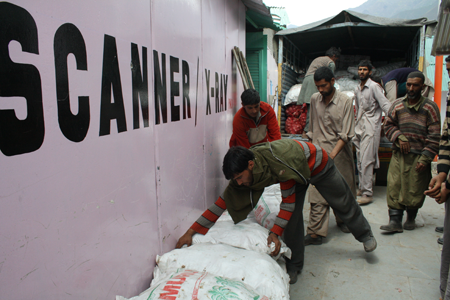As cross LoC trade completes four years, the state government has increased the overall infrastructure and requested New Delhi to include 98 more items in the ‘export’ list and five in the ‘import’ list. But will the proposals have any impact on the trade already Rs 1714.79 crore strong, TASAVUR MUSHTAQ reports.
 Launched on Oct 21, 2008, the limited barter trade on the twin LoC windows is about to complete four years of its operations. The trade started post-haste following an intense land row that divided J&K on communal lines and triggered the fall of Ghulam Nabi Azad led coalition government.
Launched on Oct 21, 2008, the limited barter trade on the twin LoC windows is about to complete four years of its operations. The trade started post-haste following an intense land row that divided J&K on communal lines and triggered the fall of Ghulam Nabi Azad led coalition government.
Limited to 21 broad categories incorporated in the Standard Operation Procedures (SOP), the trade continues to be a blind as it lacks communication and interaction between the two trading partners, besides banking mechanism and dispute resolution. Recently, the authorities from two sides permitted quarterly meetings between the two sides at the zero-point for routine trade related discussions. The barter facilitation authorities from the two sides of the divide will help in managing disputes. The trade is happening in Uri (Kashmir) and Poonch (Jammu) and is restricted to the registered individuals and from November 15, 2011onwards, the activity is now four-day-a-week exercise.
Despite many practical difficulties, the trade has registered business of Rs 1714.79 crore (US $ 325.21 millions). Since 2008-09, the trade value of export has increased from Rs 1.76 crore to Rs 197.27 crore in 2012- 2013 ending August 2012. On the other hand, the import value has also increased from Rs 93.02 crore to Rs 286.77 crore in Pakistan currency as on August, 2012.
The state government in the recently concluded session of legislative assembly revealed that while the Indian ‘exports’ were of the order of Rs 903.41 crore, the ‘imports’ from other side of Kashmir were at Rs 1469.88 crore in Pakistani currency (equal to Rs 811.38 crore at current conversion rates). Total goods sent were 151281 tons and received merchandise weighed 100823 tons. While 20128 trucks crossed over with ‘exports,’ 14233 trucks from Indian side crossed the border in the last four years.
The trade, though flourishing, is facing a lot of difficulties which are hampering its progress. In the past, the traders protested seeking redressal of their demands of increase in tradable items, installation of full body truck X-ray scanners at the Trade Facilitation Centre, creation of additional storage infrastructure for goods and warehousing and cold storage facilities at Srinagar and Jammu for smooth supply of goods.
Lack of facilities has led the vested interests to resort to hawala transactions as well. The government says they have registered seven cases against 10 individuals for their involvement in hawala in which Rs 1,62,000 was recovered. While six cases are under investigation, the government said one is sub-judice.
It is not only the lack of infrastructure and facilities that has disrupted the trade. The routes remain disrupted for various geographic reasons intermittently. There were floods and snowfall that restricted any kind of movement for many weeks. Also, in late last year, agitation by the traders in J&K over VAT on duty free trade froze any movement of goods for many months.
Talking about initiatives taken to boost the cross LoC trade, the government said in the assembly that it has invested a lot of money to create basic infrastructure. Against Rs 16.92 crore allocated for various facilities at the two border openings in J&K, the government has already booked an expenditure of Rs 14.67 crore.
In order to streamline the trade, the government has created 12 posts of different categories of manpower for running the day-to-day affairs of TFCs Chakkan-da-Bagh, Poonch and Salamabad, Uri.
At the same time, the authorities have added certain new clauses to the SOP for the barter which are in vogue since July, 2012. Under the new set-up, traders, transporters, drivers and the people associated with the barter at the trade facilitation centres in Uri and Chakan da Bagh must undergo stringent security checks.
The army has already issued tenders for purchasing a whole body scanner so that they would not require manually checking the items being imported or exported. All the drivers crossing borders will have to stay in sterilized zones so–















